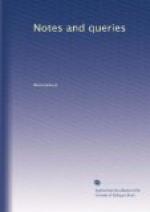“I am glad the time is come that you are to receive full orders, and that you hope it from the hands of our {98} great, worthy, and excellent Bishop, the Lord of Salisbury. This is one of the circumstances” [then the letter proceeds exactly as in the printed Letter X., and the Ms. letter concludes:] “God send you all true Christianity, with that temper, life, and manners which become it.
“I am, your hearty friend,
“Shaftesbury.”
I quote the printed beginning of Letter X., on account of the eulogy on Bishop Burnet:—
“I believed, indeed, it was your expecting me every day at —— that prevented your writing since you received orders from the good Bishop, my Lord of Salisbury; who, as he has done more than any man living for the good and honour of the Church of England and the Reformed Religion, so he now suffers more than any man from the tongues and slander of those ungrateful Churchmen, who may well call themselves by that single term of distinction, having no claim to that of Christianity or Protestant, since they have thrown off all the temper of the former and all concern or interest with the latter. I hope whatever advice the great and good Bishop gave you, will sink deeply into your mind.”
Mr. Singer has extracted from the eighth printed letter one or two sentences on Locke’s denial of innate ideas. A discussion of Locke’s views on this subject, or of Lord Shaftesbury’s contrary doctrine of a “moral sense,” is not suited to your columns; and I only wish to say that I think Mr. Singer has not made it sufficiently clear that Lord Shaftesbury’s remarks apply only to the speculative consequences, according to his own view, of a denial of innate ideas; and that Lord Shaftesbury, in another passage of the same Letters, renders the following tribute of praise to the Essay on the Human Understanding:—
“I am not sorry that I lent you Mr. Locke’s Essay on the Human Understanding, which may as well qualify for business and the world as for the sciences and a University. No one has done more towards the recalling of philosophy from barbarity into use and practice of the world, and into the company of the better and politer sort, who might well be ashamed of it in its other dress. No one has opened a better or clearer way to reasoning; and, above all, I wonder to hear him censured so much by any Church of England men, for advancing reason and bringing the use of it so much into religion, when it is by this only that we fight against the enthusiasts and repel the great enemies of our Church.”
A life of the author of the Characteristics is hardly less a desideratum than that of his grandfather, the Lord Chancellor, and would make an interesting work, written in connection with the politics as well as literature of the reigns of William and Anne; for the third Lord Shaftesbury, though prevented by ill-health




